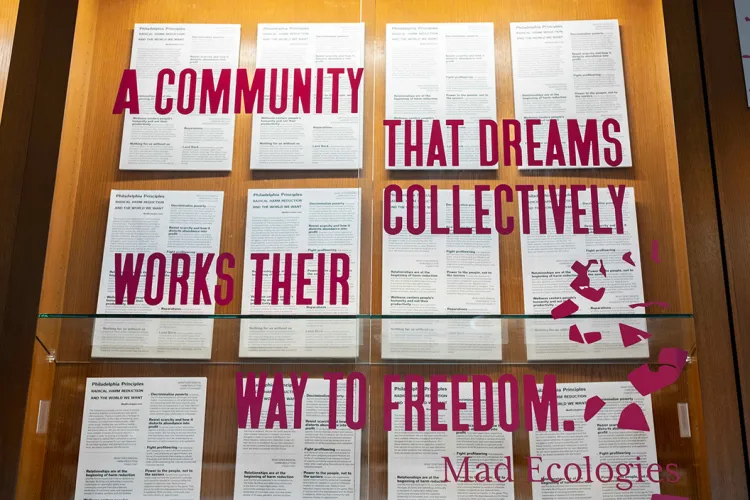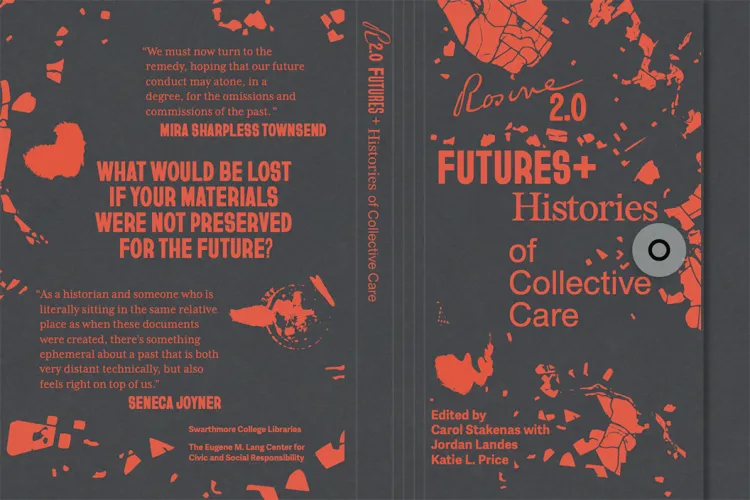Rosine 2.0 to Engage Public in Community-Driven Examination of Harm Reduction and Mutual Aid

On Thursday at 4:30 p.m., Swarthmore will host a reception at which the curator, Carol Stakenas (above), will lead a walkthrough of the exhibit.
The Rosine 2.0 project, an interdisciplinary collective of artists, harm reductionists, healers, archivists, and stakeholders in Philadelphia’s street economies, has spent the past two years grappling with the legacy and future of community care.
As part of the community-driven art project initiated by Swarthmore, they created an exhibition of artwork, ephemera, and documents to help explore the histories and creative practices of harm reduction and mutual aid in Philly.
This week, the Rosine 2.0 Collective invites the College and wider community to engage with the project at a series of public events on campus and in the city.
On Thursday at 4:30 p.m., Swarthmore will host a reception at which the curator, Carol Stakenas, will lead a walkthrough of the exhibit. Attendees will also receive an accompanying publication that showcases the efforts of the collective.

“The project was really meant to highlight Philly organizers organizing around mutual aid,” says Zissel Aronow, project manager of Rosine 2.0.
On Friday from 10 a.m. to 6 p.m., there will be a symposium, Rosine 2.0 in Context, on campus, with panels and discussion with the Rosine 2.0 Collective, joined by special guests on harm reduction and socially engaged art. The event will also feature contemporary arts organization Visual AIDS, which will screen several videos and lead the audience in a discussion.
Lastly, on Saturday from 2:00 to 6 p.m., there will be an installation, Rosine 2.0 in Practice, at the Icebox Project Space in Philly. The event will activate the materials made throughout the project through installations and workshops on radical harm reduction, grassroots healing, Black and brown histories, environmental justice, and collective organizing.
“The project was really meant to highlight Philly organizers organizing around mutual aid,” Zissel Aronow, project manager of Rosine 2.0., tells The Philadelphia Inquirer. “Each of the projects … approach collective healing and harm reduction in different ways.”
This week’s events mark the culminating stage of Rosine 2.0, in which the collective engaged with and in marginalized communities to create, learn, and imagine.
“It’s an opportunity to share what we learned,” says Stakenas, “and uplift community voices and visions for the future.”
Rosine 2.0 is a collaboration between the Swarthmore College Libraries and the Lang Center for Civic and Social Responsibility. It is inspired by the original Rosine Association (co-founded in 1847 by Mira Sharpless Townsend, a Philadelphia Quaker activist), which helped women who faced physical abuse and exploitation as a result of sex work and substance abuse.
Swarthmore’s Friends Historical Library (FHL) acquired Townsend’s papers in 2019, containing her correspondence, poetry, and other materials related to her activism, such as two casebooks documenting the lives of the women she sought to help. The Lang Center helped to activate the archives within the living communities of the Rosine 2.0 collective.

“The amount of support this project has received speaks to the power of its core ideas and values. Especially after the pandemic, people are yearning for ways to connect with each other to build more equitable communities and just futures,” says Katie Price, project director and senior associate director of the Lang Center.
Upon acquiring the papers, “we had no idea the level of research and work they would inspire,” says Jordan Landes, curator of the FHL.
Between the Towsend papers and the two cases dedicated to the life and activism of Bayard Rustin, the exhibit provides “a sense of those times while speaking to issues that are very much still with us,” says Stakenas.
The exhibition, on display in McCabe Library through mid-April, features artworks, such as fabric circles and beads and sculpture related to healing rituals from the Circle Keepers project, along with contextual materials from FHL, the Peace Collection, and the John J. Wilcox, Jr. Archives of the William Way LGBT Community Center in Philly.
Rosine 2.0 received major support from The Pew Center for Arts & Heritage, a $100,000 grant from The Andy Warhol Foundation for the Visual Arts, and additional support from The William J. Cooper Foundation and the Sager Fund.
“The amount of support this project has received speaks to the power of its core ideas and values. Especially after the pandemic, people are yearning for ways to connect with each other to build more equitable communities and just futures,” says Katie Price, project director and senior associate director of the Lang Center.
“This project’s power lies in our shared commitments to learn from history, listen to and trust each other, and make art that matters,” Price adds.
Click to RSVP for Thursday’s, Friday’s, and/or Saturday’s events, and to arrange for free transportation from campus to Philadelphia on Saturday.



